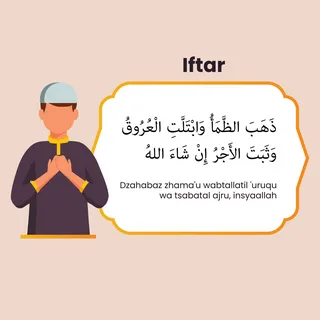Ramadan is a sacred month in Islam, where Muslims around the world observe fasting from dawn until sunset. It is a time of spiritual reflection, self-discipline, and devotion to Allah. One of the most significant aspects of fasting is breaking it at sunset, a moment marked by the recitation of special duas (supplications). These duas carry immense blessings and are an essential part of the iftar experience, in this article on Arabian Tongue website we will explorer the best Dua for Breaking the Fast During Ramadan.
The Importance of Breaking the Fast (Iftar)

Breaking the fast, known as ramadan kareem iftar time, holds both spiritual and physical benefits. It is a moment of joy and gratitude, as one completes their fast in obedience to Allah. The Prophet Muhammad (PBUH) emphasized breaking the fast with dates and water, following his Sunnah, as it provides instant energy and hydration.
Dua for Breaking the Fast During Ramadan
The most commonly recited Essential Ramadan Dua for the Holy Month for breaking the fast is:
Arabic:
اللَّهُمَّ إِنِّي لَكَ صُمْتُ وَبِكَ آمَنْتُ وَعَلَيْكَ تَوَكَّلْتُ وَعَلَى رِزْقِكَ أَفْطَرْتُ
Transliteration:
Allahumma inni laka sumtu wa bika amantu wa ‘alayka tawakkaltu wa ‘ala rizq-ika-aftartu
English Translation:
“O Allah! I fasted for You, and I believe in You, and I put my trust in You, and with Your sustenance, I break my fast.”
Explanation of the Dua
This dua expresses gratitude and reliance on Allah. Each phrase reflects:
- Laka sumtu: A declaration of fasting for the sake of Allah.
- Bika amantu: A reaffirmation of faith in Allah.
- Wa ‘alayka tawakkaltu: Demonstrating complete trust in Allah.
- Wa ‘ala rizq-ika-aftartu: Recognizing that the food and sustenance come from Allah.
Other Recommended Duas for Iftar

Another well-known supplication is:
Arabic:
ذَهَبَ الظَّمَأُ وَابْتَلَّتِ العُرُوقُ وَثَبَتَ الأَجْرُ إِنْ شَاءَ اللَّهُ
Transliteration:
Dhahaba al-zama’u wa abtallat al-‘urooq wa thabata al-ajru in sha’ Allah
English Translation:
“The thirst has gone, the veins are moistened, and the reward is certain if Allah wills.”
The Best Time to Say the Dua
- Just before taking the first bite or sip.
- Right after breaking the fast.
- During personal supplications at iftar.
Common Mistakes When Breaking the Fast
- Neglecting the dua.
- Overeating immediately after breaking the fast.
- Not drinking enough water, leading to dehydration.
Sunnah Practices While Breaking the Fast
- Eating an odd number of dates.
- Drinking water before consuming a heavy meal.
- Offering Maghrib prayer before having a full meal.
Social benefits of fasting in ramadan
Fasting in Ramadan offers several social benefits that strengthen relationships, foster empathy, and promote community cohesion. Here are some key social benefits of fasting in ramadan:
1. Strengthening Family Bonds
- Families often gather for Iftar (breaking fast) and Suhoor (pre-dawn meal), creating a sense of togetherness.
- It provides an opportunity for family members to connect, share meals, and spend quality time.
2. Enhancing Empathy and Solidarity
- Fasting allows people to experience hunger and appreciate the struggles of the less fortunate.
- This increases compassion and encourages acts of charity and kindness.
3. Encouraging Generosity and Charity
- Ramadan emphasizes Zakat (charity) and Sadaqah (voluntary giving).
- Many people donate food, money, and essentials to those in need, strengthening social welfare.
4. Promoting Community Unity
- Muslims come together in mosques for Taraweeh prayers, Quran recitation, and religious gatherings.
- It creates a strong sense of community and belonging, regardless of social status.
5. Fostering Patience and Self-Control
- Fasting teaches discipline, patience, and tolerance, which improves social interactions.
- People become more mindful of their words and actions, reducing conflicts and misunderstandings.
6. Encouraging Forgiveness and Reconciliation
- Ramadan is a time for seeking and granting forgiveness.
- Many people use this month to resolve disputes and strengthen relationships.
7. Promoting Equality and Inclusivity
- Fasting is observed by everyone, regardless of wealth or background, promoting a sense of equality.
- The shared experience creates a level playing field where all individuals feel connected.
8. Reducing Negative Social Habits
- Many people quit smoking, gossiping, or arguing, leading to a more positive and respectful social environment.
- It’s a time for self-reflection and personal growth, benefiting society as a whole.
9. Encouraging Acts of Kindness
- People are more inclined to help others, volunteer, and show kindness, which enhances social harmony.
- Simple gestures like offering dates or water for Iftar strengthen community ties.
10. Bringing Diverse People Together
- Non-Muslims often participate in Iftar gatherings, fostering interfaith understanding and mutual respect.
- Ramadan serves as a bridge between cultures and communities.
FAQs
Can I say the dua for iftar in my own language?
Yes, but reciting the original Arabic is recommended for added blessings.
Is it necessary to recite the dua out loud?
No, you can recite it silently in your heart as well.
What if I forget to say the dua before eating?
You can still say it afterward, and your fast remains valid.
Can I make personal duas during iftar time?
Yes, this is a highly recommended time for supplications.
Is there a special dua for breaking the fast in congregation?
The same duas apply, but you can also collectively pray for blessings.
Conclusion
Reciting the dua while breaking the fast is a beautiful act of worship that strengthens one’s connection with Allah. By following the Sunnah and making sincere supplications, one can attain immense spiritual rewards and blessings.


